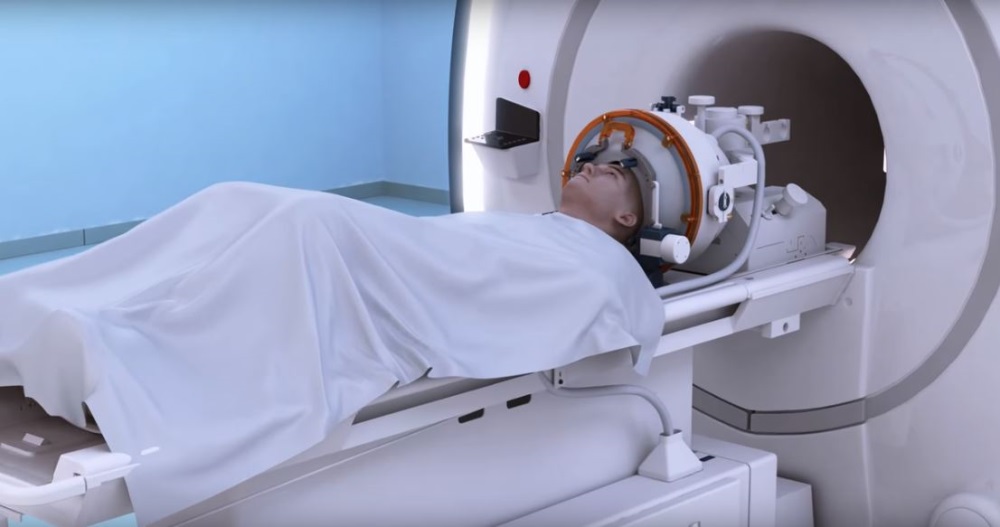Brain Ultrasound (MRgFUS Thalamotomy) For Relieving Tremors In Parkinson’s Disease
Source: Thailand Medical News Nov 29, 2019 5 years, 4 months, 3 weeks, 6 days, 21 hours, 57 minutes ago
According to a new study presented at the annual meeting of the Radiological Society of North America (RSNA), a procedure that applies pulses of focused
ultrasound to the
brain is safe and effective for reducing
tremors and improving quality of life in people with essential
tremor (ET) or
Parkinson’s disease (PD)
tremor.
(MRgFUS) thalamotomy or magnetic resonance-guided focused
ultrasound is an incisionless interventional radiology procedure in which focused beams of sound energy are used to heat and destroy a small part of a structure in the
brain called the thalamus. The procedure gives relief to the opposite side of the body, meaning that treatment to the right side of the
brain would relieve
tremors on the left side of the body, and vice versa.

Being a minimally invasive approach, focused
ultrasound has advantages over deep
brain stimulation, including a reduced risk of complications from bleeding and infections, according to study lead author Dr Federico Bruno, MD, a radiologist in the Department of Biotechnological and Applied Clinical Sciences at the University of L’Aquila in L’Aquila, Italy, in a media release.
Dr Bruno told
Thailand Medical News, “Another advantage is the immediate effect this treatment provides, unlike deep brain stimulation which requires a break-in period for the electrostimulation. Additionally, treatment with
MRgFUS requires shorter hospitalization and is a fairly well-tolerated procedure even by more fragile patients.”
For the research, Dr Bruno and colleagues enrolled 39 patients, average age 64.5 years, with disabling
tremors that had not responded to treatment. The people in the study group, including 18 with ET and 21 with PD, had experienced symptoms for an average of more than 10 years.
The team evaluated the patients for tremor severity and quality of life before
MRgFUS thalamotomy, immediately after treatment and over the course of the ensuing year.
The researchers found that 37 of 39 patients, or 95%, had substantial and immediate reduction of
tremor. These reductions in
tremor were sustained in follow-up evaluations. Quality of life evaluation showed substantial improvement in both the ET and PD groups, per the release.
Dr Bruno added, “The study we present reports our experience of over a year in the treatment of
tremor by thalamotomy with focused
ultrasound. It is worth noting that we had a high number of patients with
Parkinson’s disease in our series, compared to previously published data, where the procedure was used mainly in the treatment of essential
tremor patients.”
At the moment,
MRgFUS thalamotomy is only available at a limited number of sites worldwide, Bruno adds, bu
t may become more widespread as research findings supporting its use are published. Improvements in neuroimaging techniques that allow for greater precision and detail in planning, implementation and monitoring over time of the treatment should also expand its availability.
Dr Bruno further commented, “The clinical application of this technique for
neurological diseases is an absolute novelty, the clinical use was approved by the FDA less than three years ago. Few patients know of this treatment option so far, and there are not many specialized centers equipped with the required technology.”
Potential research in this area includes the possibility of treating both sides of the thalamus.
MRgFUS is also being explored in areas beyond movement disorders, Bruno continues. Several preclinical studies and clinical trials are looking at the technique for the treatment of other neurological conditions like neuropathic pain, epilepsy and obsessive-compulsive disorders, as well as for treatment of
brain tumors.
Reference: Minimally Invasive Procedure Relieves Tremors in Parkinson's Patients, Co-authors are Luca Panebianco, M.D., Maria Valeria Marcella Micelli, M.D., Antonella Corridore, M.D., Milvia Martino, M.D., Silvia Torlone, M.D., Marco Varrassi, M.D., Alessia Catalucci, M.D., Francesco Arrigoni, M.D., Alessandra Splendiani, M.D., and Carlo Masciocchi, M.D., Source: RSNA https://press.rsna.org/timssnet/media/pressreleases/14_pr_target.cfm?ID=2124
